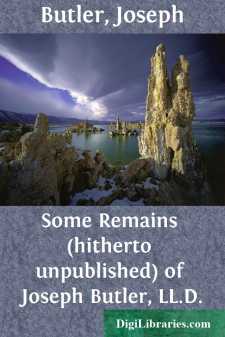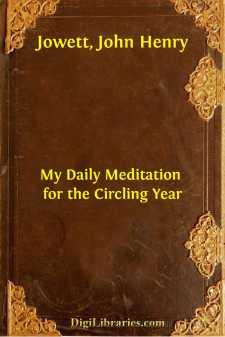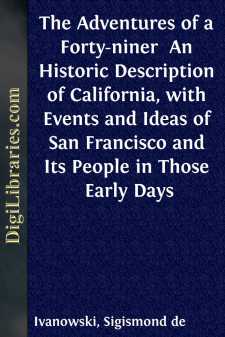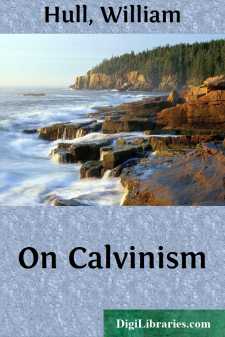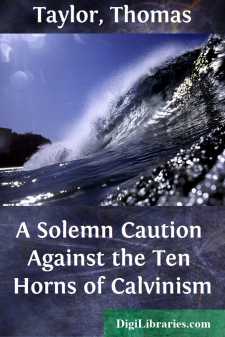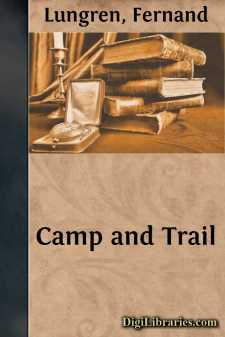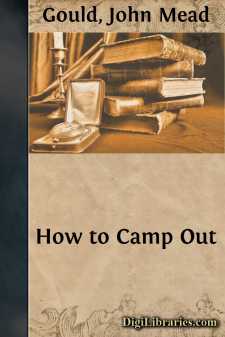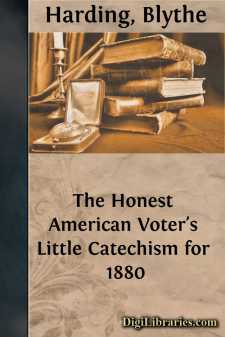Non-Classifiable
- Non-Classifiable 1768
Non-Classifiable Books
Sort by:
by:
Joseph Butler
PREFACE. It has long been a subject of regret that we should have so few remains of so great a writer as the author of the “Analogy,” not only the greatest thinker of his day, but one almost equally remarkable for his personal religion and amiability. The few fragments and letters which remain unpublished, derive from this circumstance a value wholly incommensurate with their extent, though, as to...
more...
THE UNKNOWN JOURNEY “He went out not knowing whither he went.”—Hebrews xi. 6-10. BRAM began his journey without any knowledge of his ultimate destination. He obeyed a noble impulse without any discernment of its consequences. He took “one step,” and he did not “ask to see the distant scene.” And that is faith, to do God’s will here and now, quietly leaving the results to Him. Faith is...
more...
THE NATIVE SON The only drawback to writing about California is that scenery and climate—and weather even—will creep in. Inevitably anything you produce sounds like a cross between a railroad folder and a circus program. You can't discuss the people without describing their background; for they reflect it perfectly; or their climate, because it has helped to make them the superb beings they...
more...
THE CALIFORNIA PIONEER SOCIETY. The California Pioneer Society was organized in August, 1850. The photograph of their building appears on the cover of this book, W.D.M. Howard was their first president. Among their early presidents, and prominent in the days of Forty-niners, were Samuel Branan, Thomas Larkins, Wm. D. Farewell, and James Lick—who liberally endowed it. It was organized for the purpose...
more...
A Start in Life. I have entitled this little book "A Start in Life," because it conveys information which would enable any person possessing a small capital, with some industry, patience, and steady habits, to make a start in life which, humanly speaking, could not fail of success. The old countries of Europe contain a superabundant population; every branch of professional and commercial life...
more...
by:
William Hull
ir, When I venture to inscribe to you the following pages, I am fearless of having applied to me Johnson’s definition of a dedicator, “one who inscribes his work to a patron with compliment and servility.” Adulation, Sir, from any quarter, you would resent as an indignity, and the tenor of my own life and writings will secure me from the imputation of servile deference to others, with whatever...
more...
by:
Thomas Taylor
everend Sir, THE author of the following strictures hopes your candour will pardon his addressing you in this public manner. Who he is, or what he is, signifies very little; only he begs leave to intimate, that he hopes he is a follower of that Saviour who “gave himself a ransom for all.” He was convinced when young in years, in a great measure, by reading “Alleine’s Alarm;” and the...
more...
by:
Fernand Lungren
CHAPTER I THE WILDERNESS TRAVELERThe First QualificationMANY people have asked me what, all things considered, is the most valuable quality a wilderness traveler can possess. Always I have replied unhesitatingly; for no matter how useful or desirable such attributes as patience, courage, strength, endurance, good nature, and ingenuity, may prove to be, undoubtedly a man with them but without the sense...
more...
by:
John Mead Gould
CHAPTER I. GETTING READY. The hope of camping out that comes over one in early spring, the laying of plans and arranging of details, is, I sometimes think, even more enjoyable than reality itself. As there is pleasure in this, let me advise you to give a practical turn to your anticipations. Think over and decide whether you will walk, go horseback, sail, camp out in one place, or what you will do;...
more...
by:
Blythe Harding
THE DIALOGUE. What is a republic? —A state, or Union of states, in which the people holds supreme power. How does the people exercise this power? —Through men elected for this purpose. What are these men called? —Senators and members of Congress or Congressmen. Is there a head or chief in a republic? —Certainly. What is he called? —The President. Must the President be elected? —Yes, by the...
more...


